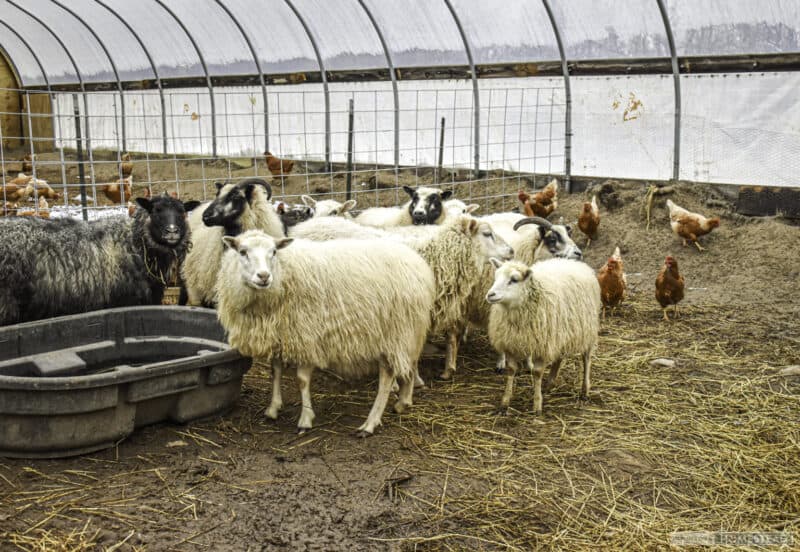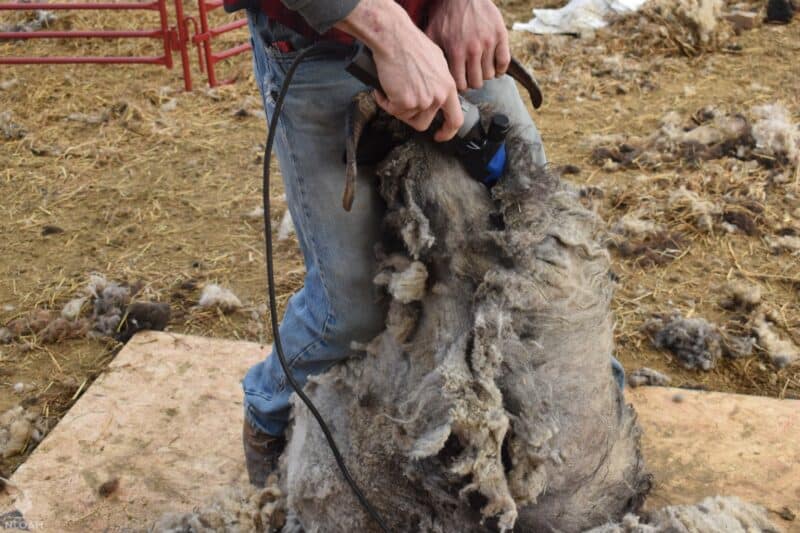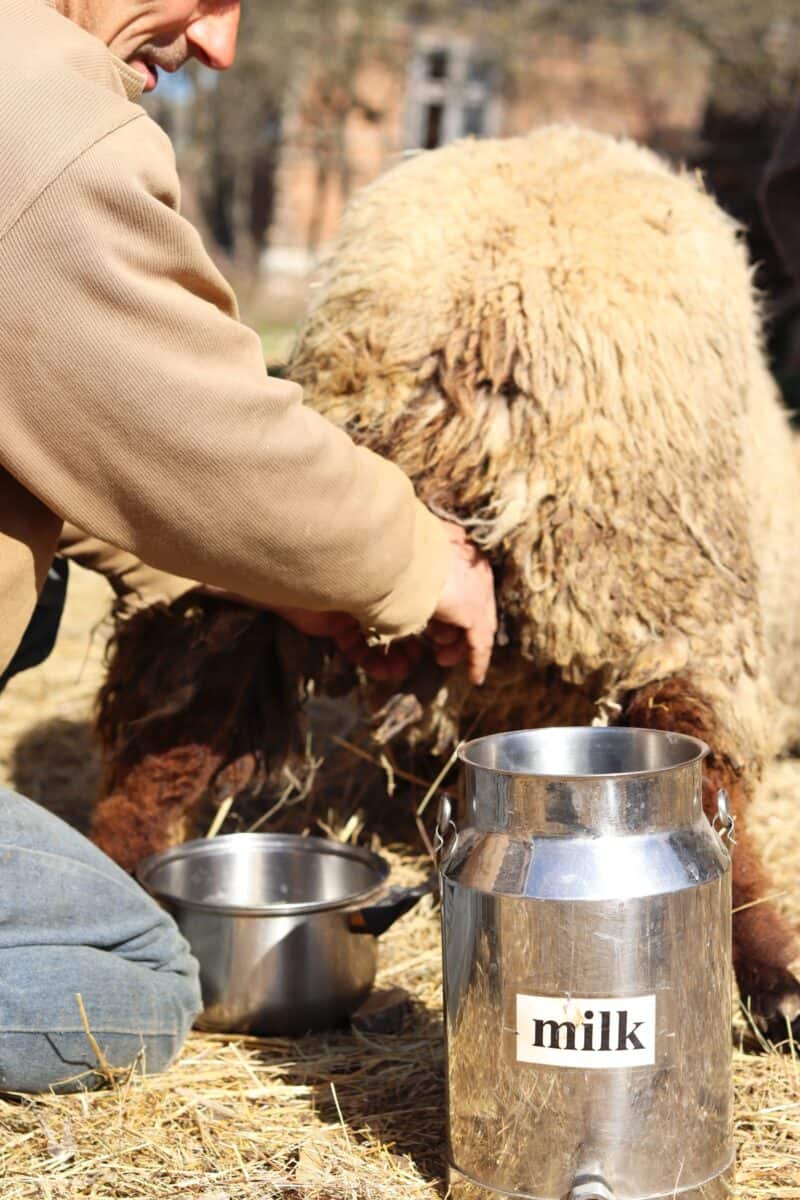Have you ever wondered what sheep are really good for? Sure, everyone knows they are “the” source of wool, but is that all we keep sheep for? Seems like an awful lot of work and money spent to just make wool!

There has to be more to these animals than meets the eye… So, what are sheep good for?
Sheep can be used for producing wool fiber, but also meat and dairy products as well as a variety of scientific purposes and even conservation efforts.
I’m telling you, sheep are truly amazing and good for so much more than wool alone, although that is a pretty awesome resource by itself.
In this article I’ll tell you all about the different things that sheep are being utilized for and why they’re an essential part of our world today.
Sheep Wool Makes the Most Useful Fiber there Is
The number one reason sheep are kept, and one of the very best. For centuries, sheep wool has been a vital material in clothing and textiles.
This versatile, natural fiber offers excellent insulation, breathability, and wicking properties; it even insulates when soaking wet!
One of the most outstanding properties of sheep wool is its ability to truly regulate temperature, not just insulate.

It can help keep you warm in cold weather and cool in hot weather, just like it helps sheep survive in nature.
It’s also naturally flame-resistant, making it an ideal choice for any items that would benefit from fire resistance such as curtains and upholstery.
But the benefits don’t stop there: Wool is also hypoallergenic and resistant to bacterial growth and odors. It is relatively easy to care for, and with proper maintenance, it can last for years.
Aside from its practical uses, sheep wool is also used in arts and crafts. Felt-making, knitting, and weaving are all popular ways to create beautiful and functional items from this natural material.
I am starting to wonder why we mess with all these synthetics in the first place!
Sheep Meat is Delicious and Nutritious
Although not particularly popular in the US anymore, it used to be in the earlier part of the 20th century.
Sheep meat, also known as lamb or mutton depending on the age of the sheep it comes from, is a delicacy and a staple enjoyed by people all over the world.
It’s a lean protein source that is rich in essential nutrients such as iron, zinc, and vitamin B12 and also low in fat compared to other red meats, making it an excellent choice for a healthy diet.
In addition to its nutritional benefits, sheep meat is also truly delicious when properly prepared. It has a unique flavor that pairs well with a variety of herbs and spices.
Prepared by roasting, grilling, or stewing, it can be served as a main dish or as a delicious addition to salads, soups and sandwiches.
Sheep meat is also a highly sustainable choice. Sheep require less space and resources overall compared to cows, making them an excellent option for smaller-scale production.
They’re also able to easily graze on land that is totally unsuitable for crop production, helping to maintain ecological balance and prevent soil erosion while maximizing the productivity of any given parcel.
Sheep meat is a great choice among all the meats, for sure.
Sheep are Great Land Management Animals
If you want to keep the grass short, sheep are a fantastic choice for land management. They are natural grazers, and their diet consists mainly of grass and some other vegetation.
By allowing sheep to graze on pastureland, you can keep them healthy while preventing the overgrowth of grass and other unwanted plants.
Sheep are also an excellent choice for weed control. Just by eating they’re able to reduce the need for harmful and persistent herbicide chems.
Aside from maintaining the health of the ecosystem, this will keep your bills down when it comes to maintaining your land. And, you won’t need to fire up the tractor or mower, or even lift a finger. A win-win.
Sheep Manure Can Make Good Fertilizer
Like many other livestock species, sheep manure is a valuable resource for any farmer or gardener.
It’s an excellent source of organic matter, nitrogen, and other essential nutrients that plants need to grow.
And unlike so many factory-made chemical fertilizers, sheep manure is slow-release, helping to improve soil fertility over time without shocking sensitive plants.
One of the benefits of using sheep manure as fertilizer is that it helps improve soil structure. The organic matter in sheep manure specifically helps to increase soil porosity, allowing water and air to move freely through the soil.
This, in turn, promotes even healthier root growth, and improves soil drainage with repeated applications. I turn right around and repurpose my flock’s manure to fortify the pasturage they graze on during rotation.
Sheep manure is also a truly environmentally friendly option: It’s a renewable resource that can be used to totally replace synthetic fertilizers that so often contain detrimental chemicals.
Some Sheep Breeds are Used as Dairy Animals
In North America, you are probably already familiar with goat’s milk, but have you ever heard of sheep’s milk?
While cows are the most common dairy animals around much of the world, certain sheep breeds like East Friesian, Lacaune, and Awassi are also used for milk production intended for human consumption.

These breeds have been specifically developed for not only for their high milk production but also for the overall quality of their milk; sheep’s milk is often said to taste richer and creamier than cow’s.
Sheep’s milk is also highly nutritious, containing more protein, calcium, and vitamins than cow’s milk. It is also easier to digest, making it an excellent choice for people who are lactose intolerant.
Sheep milk is used to make a variety of dairy products just like our other animals, including cheese, yogurt, and butter.
Sheep Play Important Roles in Biological Research
One of the most important, and also misunderstood, purposes of raising sheep is for… science. Sheep have played important roles in biological research for many years due to their surprising physiological similarities to humans.
Sheep are particularly useful in reproductive research and also studies on genetics, reproduction, and disease.
It’s sheep experimentation that paved the way for human treatments for diseases such as cystic fibrosis and many kinds of heart disease.
Furthermore, sheep are also an excellent model for studying neurological disorders in humans. Believe it or not: their brains are similar enough structure to human brains, making them ideal for research on conditions such as Alzheimer’s and Parkinson’s.
But, there is a dark side to this, of course: Despite their immense and life-saving value in research, ethical concerns have been raised over the use of these innocent animals in scientific experimentation.
In any case, sheep are indispensable for this purpose, and trials are showing no signs of slowing.
Sheep are at the Center of Cultural and Religious Holidays
Sheep have been a central part of cultural and religious celebrations around the world, in many cultures and many faiths, for centuries.
For instance, lamb is an essential part of traditional cuisine during holidays such as Easter and Christmas.
In addition to being a delicious meal, the presence of sheep in these celebrations has deep cultural and historical significance.
During Easter, lamb is a symbol of rebirth and renewal. As for Christmas, the common image of a lamb at the manger is symbolic of Jesus Christ’s nativity and his ability to bring peace on earth.
Jesus Himself is referred to as the “Lamb of God”, emphasizing his sacrificial nature. Sheep are also an important symbol in many Islamic cultures; the sacrifice of a sheep during the festival of Eid al-Adha is an important part of the celebration.
The sacrifice is seen as a way to honor the prophet Ibrahim’s willingness to sacrifice his son for Allah.
In some cultures, sheep are also instrumental to the creation of traditional clothing and textiles. For example, in Scotland, the wool from the native sheep breeds is used to create the iconic tartan fabrics that are synonymous with the Scots.
Sheep Can Even Be Therapy Animals!
The therapeutic benefits of animals are well-established. And it turns out sheep are increasingly being recognized for their special therapeutic qualities as well. Sheep are calm and gentle animals that can help reduce stress and anxiety in humans.
Used in animal-assisted therapy, or AAT programs, sheep can help people with physical, emotional, or mental disabilities by providing a calming presence and a source of tactile stimulation.
Sheep are also used in various farming therapy programs- imagine that! While most of us do it as a living or calling, these programs use farming activities such as herding and shearing sheep as a form of therapy.
The activities help build self-esteem, social skills, and a sense of accomplishment in folks who are struggling with mental issues.
Tom has lived and worked on farms and homesteads from the Carolinas to Kentucky and beyond. He is passionate about helping people prepare for tough times by embracing lifestyles of self-sufficiency.
